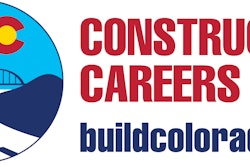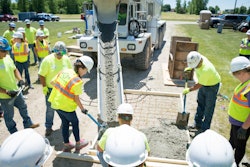
This four-part article series addresses nationwide programs and initiatives developed to recruit and train skilled workers to help fill the construction industry’s labor shortage and workforce needs.
Construction employment is up and the unemployment rate is dropping. Yet even with these positive numbers the construction industry is still facing a real threat of worker shortage with the lack of skilled laborers entering the industry. Nationwide programs and initiatives are working to recruit, educate and train the next generation of construction workers.
Construction Craft Professional Demand through June 2018
Construction Career Days
Construction Career Days (CCD) events are held all across the nation as a way to introduce middle and high school students to the construction industry.
The first Construction Careers Fair was held in March 1999 in Lewisville, Texas. Founders Mike LaPointe, Humberto Martinez, Ross Martinez and Greg Mooney started the program to address the 2,000 or so vacant construction jobs in the Dallas/Ft. Worth area. In addition, Humberto Martinez says the founders wanted to address the general public’s negative image of the construction industry and the lack of information about the diversity of careers the industry offers.
The founders wanted to create something that would offer youth more than what the typical “career fair” was offering. They wanted to present an attention grabbing, hands-on experience for attendees. “The CCD program was specifically focused on showcasing careers in the industry by having the kids perform one or more activities typical of the various careers the industry has to offer,” Martinez says. Accompanied by personnel who actually work in the particular field, CCD attendees learn what each career involves, what it takes to prepare for the career and the salary range they can expect.
According to Martinez, youth attending the events have the opportunity to:
- Operate heavy pieces of construction equipment
- Use survey and GPS instruments
- Operate various power tools
- Weld
- Tie steel
- Design and load test a bridge using CAD software
- Perform electrical wiring exercises
- Do pipe fitting
- Participate in various construction-related competitions
- Assist in designing or operating traffic control devices
- Operate various equipment simulators
- Construct a toolbox out of wood or sheet metal
- Climb a utility pole and perform an assigned task
- Learn about the sequencing of various types of construction work
The success of the very first event led the founders to replicate the event in other parts of Texas, Arkansas, New Mexico, Oklahoma and Louisiana.
Over 600,000 students have participated in CCD events offered throughout the country, Martinez says. Events are typically planned and hosted by local teams representing the industry, labor organizations, government, educators, schools and community organizations. Construction Career Days events typically last one to three days, and many become annual events.
“Many teams are using the events as a springboard to develop additional programs (teacher externships, mentoring and shadowing programs, speakers' lists, etc.) to continue the interaction between the industry and the schools that participate in the events,” Martinez says.
Construction contractors can get involved in Construction Career Days either by contacting a person in their state who is running an existing CCD event, or if there isn’t an active program in the area contractors could help start one. Anyone looking to start a new CCD event or find the appropriate contact for your state can contact Humberto Martinez at [email protected].
YouthBuild
YouthBuild is a unique program. Not only is the goal to help young adults learn necessary skills required to work in the construction industry, but the program places an equal emphasis on helping the students create better lives for themselves.
YouthBuild programs across the country are designed to help low-income, often referred to as “at risk” but more progressively called “opportunity youth,” students ages 16 to 24 with the opportunity to learn construction skills through building affordable housing and other community assets. Since 1994, YouthBuild programs have helped over 130,000 young adults who have produced over 28,000 units of affordable housing.
The initiative consists of 260 YouthBuild programs across the United States. These programs are sponsored and managed by local nonprofits, community colleges and government agencies with YouthBuild USA serving as the overarching advocate for the individual programs.
Each year an average of 10,000 students enroll full-time in one of the YouthBuild programs, and many of the programs have waiting lists. Students in the program — which typically runs 10 months — spend half of their time on a jobsite getting hands-on experience and knowledge in the construction industry. The other half of the time students are in the classroom earning a high school diploma or its equivalent.
When the first YouthBuild program was started in 1978, the focus was on residential construction. While building houses is still the core of the program, some YouthBuild programs have recognized a shift in construction industry needs and are placing graduates into other areas of construction including commercial and highway construction.
While not all the students who participate in a YouthBuild program continue into jobs in the construction industry, many of the YouthBuild programs do place up to 30% of graduates into construction industry jobs, according to Daryl Wright, vice president for employer partnerships with YouthBuild USA.
There are several ways contractors can become involved with their local programs including offering job shadow or internship opportunities, mentoring, making presentations in the classroom and hiring YouthBuild graduates. Contractors can search the YouthBuild Program Directory to find programs in their area.
Contractors can also contact Daryl Wright at YouthBuild USA to inquire about partnership opportunities.
Job Corps
There are 125 Job Corps centers across the country that provide no-cost education and vocational training for young adults ages 16 to 24. Job Corps is funded by Congress, administered by the Department of Labor and operated by private companies and other federal agencies. The goal is to “attract eligible young people, teach them the skills they need to become employable and independent, and place them in meaningful jobs or further education.”
All Job Corps applicants are identified and screened for eligibility. Each Job Corps center is unique, and while they don’t all offer the same skills training many do have programs geared to the construction industry including carpentry, heavy equipment operations, cement masonry, bricklaying and more. All of the Job Corps national career training programs are aligned with more than 350 industry-recognized certifications or union apprenticeship programs.
The Job Corps program can provide construction contractors with well-trained, entry-level employees. Job Corps will also work with employers searching for entry-level employees by helping to screen eligible students that will be the best possible candidates for the job.
In addition, contractors can establish a training partnership with Job Corps, which allows the program to teach the specific skills the construction company needs in its future employees.
Nationwide Initiatives Work to Recruit Construction Laborers
Education is Key to Recruit, Develop the New Construction Workforce
Apprenticeships are Still a Viable Source of Construction Workforce Development
What is Your State Doing to Develop the Construction Workforce?





![[VIDEO] AGC Working to Rebuild Pipeline of Qualified Skilled Laborers](https://img.forconstructionpros.com/files/base/acbm/fcp/image/2017/03/default.58c2ac99763cd.png?auto=format%2Ccompress&fit=crop&h=167&q=70&w=250)













